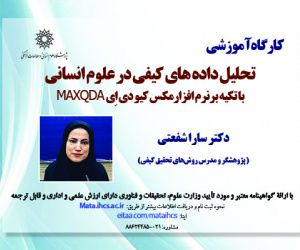شناسایی نقش های دانشگاه در نظام نوآوری منطقه ای: مرور نظام مند ادبیات (مقاله علمی وزارت علوم)
درجه علمی: نشریه علمی (وزارت علوم)
آرشیو
چکیده
با درک بهتر تأثیر دانشگاه ها بر نظام نوآوری منطقه ای می توان به بهبود همکاری ها و ایجاد راه کارهای مؤثر برای ارتقاء توانمندی های محلی و افزایش رقابت پذیری اقتصادی دست یافت. بنابراین هدف این پژوهش، مرور نظام مند ادبیات موجود در زمینه نقش دانشگاه ها در نظام نوآوری منطقه ای برای شناسایی مؤلفه های مربوط به آن، با استفاده از الگوی پیشایندها، تصمیمات و پیامدهاست. افزون بر این، در این مطالعه از چارچوب پریزما برای انتخاب 42 مقاله مربوط به نقش دانشگاه ها در نظام نوآوری منطقه ای استفاده شده است. نتایج نشان داد که پیشایندها شامل: توسعه و مدیریت پایگاه های دانش، جذب سرمایه انسانی و استعدادها، وجود ارتباط بین دانشگاه و سایر ذی نفعان، حمایت دولت، فراهم کردن و بهبود زیرساخت، دسترسی به منابع مالی، حمایت از نوآوری و کارآفرینی؛ تصمیمات شامل: اشاعه و تسهیم دانش، آموزش نیروی انسانی، تطبیق برنامه های آموزشی با نیاز منطقه، راهبرد همکاری با شرکت ها، راهبرد همکاری با دولت، تقویت ظرفیت های نوآوری و پیامدها شامل: به کارگیری و تجاری سازی دانش، توسعه نیروی انسانی، تسهیل و تقویت همکاری میان ذی نفعان، ارتقای کیفیت زندگی شهروندان، رسیدگی و حل مشکلات جامعه، ویژندسازی منطقه ای، فرهنگ سازی و تقویت فرهنگ، ارتقای کارآفرینی و نوآوری، تقویت رقابت پذیری کسب وکار، افزایش نرخ اشتغال و تحول اقتصادی است. این نتایج می توانند به سیاست گذاران کمک کنند تا راهبردهای مؤثرتری را برای تقویت همکاری بین دانشگاه ها و صنایع تدوین کنند. همچنین، حمایت های مالی و زیرساختی از دانشگاه ها باید در اولویت قرار گیرد تا به توسعه پایدار و افزایش رقابت پذیری اقتصادی منطقه ای کمک کند. تقویت ارتباطات بین دانشگاه ها و سایر ذی نفعان، به ویژه در زمینه نوآوری و کارآفرینی، می تواند به ایجاد محیطی مساعد برای رشد اقتصادی و اجتماعی منجر شود.Identifying the Role of Universities in Regional Innovation Systems: A Systematic Literature Review
A better understanding of the impact of universities on regional innovation systems can lead to improved collaborations and the creation of effective solutions to enhance local capabilities and increase economic competitiveness. Therefore, this research aims to systematically review the existing literature on the role of universities in regional innovation systems to identify relevant components, using the Antecedents, Decisions, and Outcomes (ADO) model.
In addition, this study employs the PRISMA framework to select 42 articles related to the role of universities in regional innovation systems. The results indicate that the antecedents include the development and management of knowledge bases, attracting human capital and talent, the existence of connections between universities and other stakeholders, government support, providing and improving infrastructure, access to financial resources, and support for innovation and entrepreneurship. The decisions include promoting and sharing knowledge, training human resources, aligning educational programs with regional needs, collaborating strategies with companies, collaborating strategies with the government, and enhancing innovation capacities. The outcomes include the application and commercialization of knowledge, the development of human resources, facilitating and strengthening cooperation among stakeholders, improving the quality of life for citizens, addressing and solving community problems, regional branding, cultural development and strengthening, enhancing entrepreneurship and innovation, increasing business competitiveness, raising employment rates, and economic transformation. These results can help policymakers develop more effective strategies to strengthen university-industry collaboration. Also, financial and infrastructure support for universities should be prioritized to contribute to sustainable development and enhance regional economic competitiveness. Strengthening connections between universities and other stakeholders, especially in the field of innovation and entrepreneurship, can lead to the creation of a conducive environment for economic and social growth.











